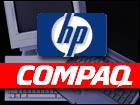|
Compaq shares fall 13%
|
 |
December 10, 2001: 4:06 p.m. ET
Packard Foundation rejection raises doubt about HP-Compaq merger.
By Luisa Beltran
|
NEW YORK (CNN/Money) - Compaq Computer Corp. shares shed more than 13 percent Monday as investors and analysts began to doubt whether Hewlett-Packard would succeed in its $24 billion takeover.
Analysts believe it will be an uphill battle for HP-Compaq to complete their merger now that the David and Lucille Packard Foundation are set to vote against the deal.
"Our analysis suggests that roughly 67 percent of institutional shareholders would need to vote in favor of the deal in order for it to pass," said analyst Joel Wagonfeld, of Banc of America Securities in a research note dated Dec. 9. "We view this as highly unlikely, particularly in light of Walter Hewlett's intention to publicly solicit proxies."
The Packard Foundation, which owns more than 10 percent of HP shares, surprised many when it made a preliminary decision Friday to vote its shares against the deal. Other heirs of the founding Hewlett and Packard families also are opposed to the merger. Combined, the Packard Foundation and the heirs hold roughly 19 percent of HP shares.
Hewlett-Packard said it will continue to meet with investors, customers and partners, and employees to educate them on the merger.
"We hope that the Foundation and the family will change their views," a spokeswoman said, adding that the company will provide more information in coming weeks.
HP is sticking with its merger pact struck Sept. 4 and still aims to present the deal to shareholders sometime next year. For now, the company will continue with the regulatory process and will resume talks with the European Commission and the Federal Trace Commission in the United States.
The company said it plans to file a proxy on the takeover early next year.
Neither the Packard Foundation nor Compaq could be reached for comment Monday.
As Compaq (CPQ: down $0.37 to $9.42, Research, Estimates) shares declined, HP (HWP: down $0.57 to $21.24, Research, Estimates) were off 2 percent.
Odds low HP succeed's in $24B Compaq takeover
Analysts Monday rated chances of the HP takeover succeeding at about 20 to 30 percent, down from the 50 to 60 percent odds before the Packard Foundation's decision.
"There is a low chance of this going through now," A.G. Edwards & Sons analyst Shelby Seyrafi said.
Walter Hewlett, son of Hewlett-Packard co-founder William Hewlett, had indicated earlier he would vote against the merger. On Friday, he vowed to block the deal if it were brought to a shareholder vote. Hewlett claims the takeover would increase HP's exposure to the waning PC business.
HP and Compaq have yet to set a date for the shareholder votes but the chances of the deal making it before stockholders is slim, especially if it becomes obvious the deal will be voted down, influential Bear Stearns analyst Andy Neff said.
HP can't call off the deal on its own, but any of three scenarios could end the transaction: The boards of both companies could call off the transaction, a material adverse change could occur, or either set of shareholders could vote to end the merger.
Management at HP and Compaq are both committed to the merger and ending it would probably lead to the departure of HP CEO Carly Fiorina, analysts said.
"Many influential insiders now oppose the deal, even though terminating it would presumably lead to management changes," Wagonfeld, of BofA said.
Putting the merger before shareholders would also push both companies into disarray for the months leading up to the vote as they would likely have to wage a proxy battle with Walter Hewlett.
But the Packard Foundation's decision Friday could leave some wiggle room for the companies to restructure the merger and get it approved, analysts said.
"This definitely increases the likelihood of a restructuring," A.G. Edwards' Seyrafi said.
A revision of the merger could call for HP-Compaq to sell some assets or minimize exposure to the PC business, Neff of Bear Stearns said.
"We would assume any revising of the terms would involve the disposal of the PC business in some fashion - which could be construed as positive for Dell - although there could also be a change in the pricing terms, although we don't think that the latter would solve the objections of the family," Neff wrote in a research note Monday.
HP now must persuade its institutional investors, which own about 60 percent of its shares, to agree to the merger.
A decision by Institutional Shareholder Service, which was hired by some institutional investors to advise on the deal, could have significant weight, analysts and industry sources said. ISS will look at the merger based on financial and governance issues.
Some institutions rely solely on ISS's judgment to make their decision while others will consider the shareholder services firm's recommendation as well as other analysis of the deal, an industry source said.
ISS has yet to make a decision how it will vote, spokesman Rich Ferlauto said.
"We are going to make independent judgment based on what is best for shareholder value," he said. "We will look at this independently and the families' position won't affect us one way or another."
ISS will look at all information available on the merger including the negative report from Booz Allen that the Packard Foundation used, another industry source said.
ISS will issue its report once the companies have filed their final proxy on the merger, Ferlauto said. 
|
|
|
|
|
|

|

